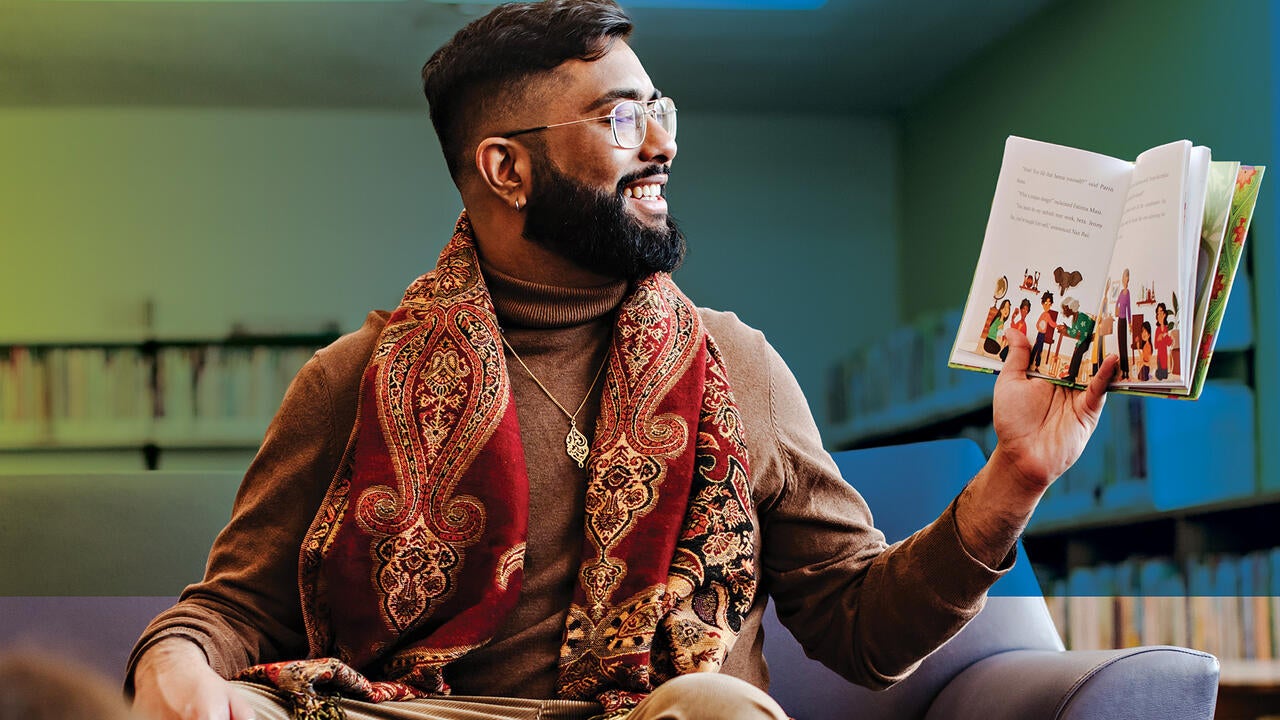
Mehndi Boy: The courage to be your true self
Zain Bandali publishes an early-reader chapter book that explores gender norms and sense of belonging in a community

Zain Bandali publishes an early-reader chapter book that explores gender norms and sense of belonging in a community
By Angelica Marie Sanchez Waterloo MagazineWhen Zain Bandali (BES ’20) was growing up, he discovered a love for mehndi, the ancient living art form of henna tattoo. The tradition is popular in South Asia but was considered something only women and girls could do.
Despite encountering discouragement early on, Bandali, an Ismaili Muslim Queer artist of Indo-Tanzanian heritage, became the only boy at his local Jamatkhana (the place of worship and community centre for Ismaili Muslims) doing mehndi for the elders and kids in his community.
That’s where the idea to write his book, Mehndi Boy, came to life.
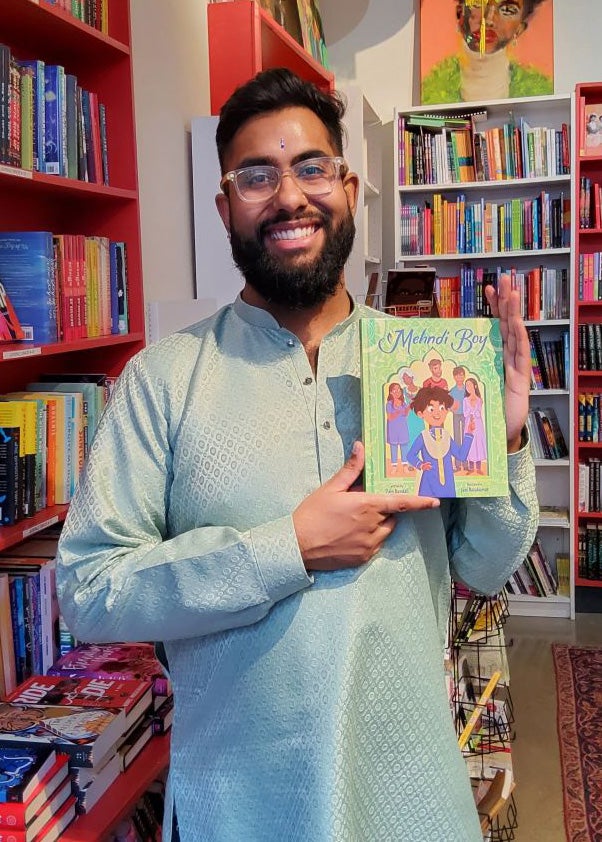 “With this book, I wanted to celebrate creativity and celebrate a little boy just being themselves. A little boy having the possibility to dream of what they want to do and what they want to express. That's ultimately what happiness is to me — having the ability to be unapologetically oneself,” Bandali said.
“With this book, I wanted to celebrate creativity and celebrate a little boy just being themselves. A little boy having the possibility to dream of what they want to do and what they want to express. That's ultimately what happiness is to me — having the ability to be unapologetically oneself,” Bandali said.
What started as an idea scribbled in his notebook years ago, Mehndi Boy is about Tehzeeb, a young boy who explores his passion for mehndi. The story, published by Annick Press, closely resembles Bandali’s childhood experience.
While everyone seems to celebrate Tehzeeb’s journey of expressing his true self, his favourite Ayaz Uncle, on the other hand, struggles to understand his nephew and his passion for mehndi. Tehzeeb battles with self-doubt and wonders, “Was he not a boy? Or not the right kind of boy?” as he navigates the expected gender norms of his culture.
“There is so much innate happiness when we see young kids. They're so inquisitive — they just want to experiment and try their best,” Bandali said. “There's such a willingness to be creative, and sometimes we stifle our kids … when they should just get a choice at the end of the day to see what's really possible.”
Through Mehndi Boy, Bandali pushes gender norms in a simple way so kids can feel inspired and have the courage to accept their true selves at a young age. He also wanted other little boys to see mehndi as an art form rather than something that's strictly gendered.
The messages in Mehndi Boy are not just for children — they allow parents, grandparents and other caregivers to learn from their kids as they explore the similarities and differences of their generational experiences together.
Many people would describe finding happiness as a constant journey of ebbs and flows in life. For Bandali, 2023 has been one of those years. Five months before his book Mehndi Boy was published, Bandali’s father passed away unexpectedly, and his life changed forever.
“The thing about happiness, and as corny as it is, it's truly a pursuit,” Bandali said. “With what's happening in the world and what’s happening in my personal life — there is immense grief. Life is just this constant struggle, and you just have to put your best foot forward. There are going to be moments of happiness and there are also going to be moments when I don’t necessarily feel the happiest.”
Bandali recalled navigating the first few months after his father passed away as a challenging experience. During this time, he would find himself striving to attend events such as the Toronto Pride Parade and a Muslim Pride event over the summer months.
Despite being in a state of grief, he still had the courage to speak about what was important to him while celebrating his identity with others in the 2SLGBTQIA+ community. Bandali said he knew his dad would have been excited and proud to see him stand up for his beliefs.
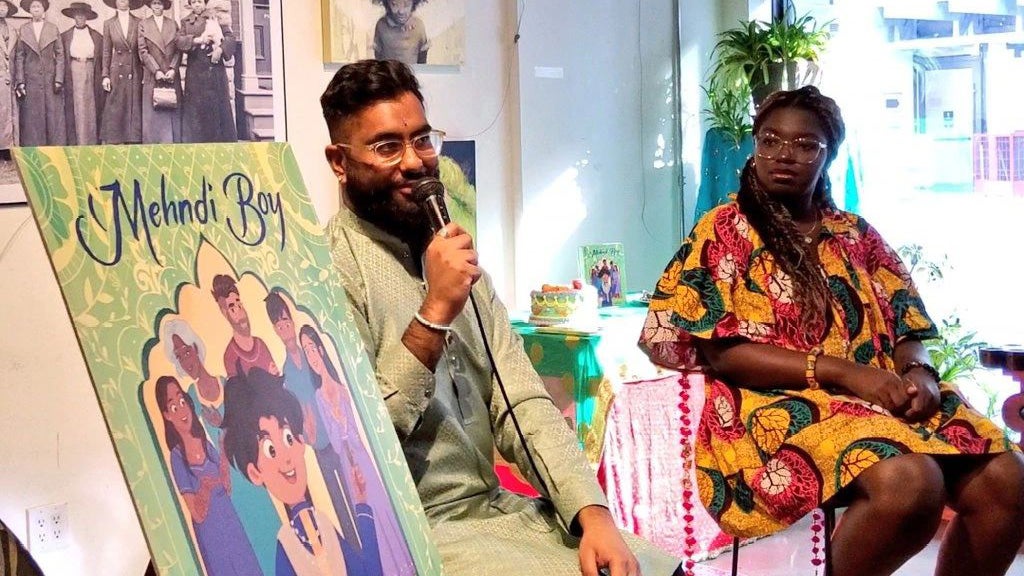
In October 2023, when Bandali launched Mehndi Boy, he was both surprised and blessed to see his extended family attend to share their support. Although they weren’t as vocal with their allyship in his Queerness in the past, he was happy they held a safe space for him during his moments of grief.
“I'm also glad my dad got to see an advanced review copy of Mehndi Boy, and my mom read it to him — so that is my happiness.”
Bandali continues to put his best foot forward by holding onto the memories and the important values his dad instilled within him, carrying his father’s legacy in all parts of his life.
That's ultimately what happiness is to me — having the ability to be unapologetically oneself.
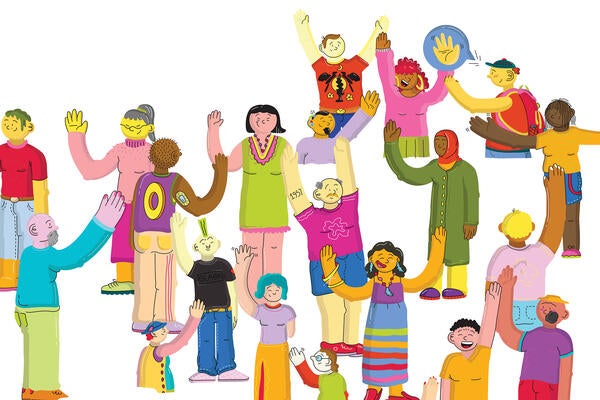
Read more
World-class researchers shape new ways to foster happiness and personal well-being

Read more
Waterloo graduate Simon Chan identifies three key stages to navigating the non-financial aspects of retirement
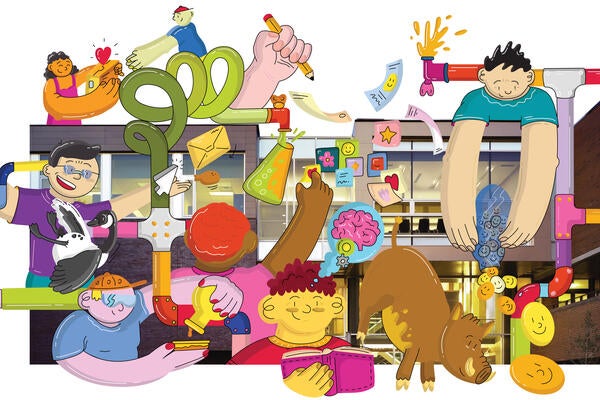
Read more
First-year students hone more than their research skills by exploring what it means to be happy
The University of Waterloo acknowledges that much of our work takes place on the traditional territory of the Neutral, Anishinaabeg and Haudenosaunee peoples. Our main campus is situated on the Haldimand Tract, the land granted to the Six Nations that includes six miles on each side of the Grand River. Our active work toward reconciliation takes place across our campuses through research, learning, teaching, and community building, and is co-ordinated within the Office of Indigenous Relations.